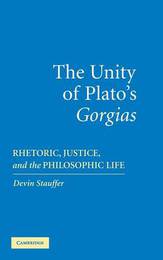
|
The Unity of Plato's 'Gorgias': Rhetoric, Justice, and the Philosophic Life
Hardback
Main Details
| Title |
The Unity of Plato's 'Gorgias': Rhetoric, Justice, and the Philosophic Life
|
| Authors and Contributors |
By (author) Devin Stauffer
|
| Physical Properties |
| Format:Hardback | | Pages:200 | | Dimensions(mm): Height 235,Width 160 |
|
| Category/Genre | Western philosophy - Ancient to c 500
Ethics and moral philosophy
Social and political philosophy |
|---|
| ISBN/Barcode |
9780521858472
|
| Classifications | Dewey:170 |
|---|
| Audience | | Professional & Vocational | |
|---|
|
Publishing Details |
| Publisher |
Cambridge University Press
|
| Imprint |
Cambridge University Press
|
| Publication Date |
10 April 2006 |
| Publication Country |
United Kingdom
|
Description
Stauffer demonstrates the complex unity of Plato's Gorgias through a careful analysis of the dialogue's three main sections. This includes Socrates' famous argumentative duel with Callicles, a passionate critic of justice and philosophy, showing how the seemingly disparate themes of rhetoric, justice and the philosophic life are woven together into a coherent whole. His interpretation of the Gorgias sheds new light on Plato's thought, showing that Plato and Socrates had a more favourable view of rhetoric than is usually supposed. Stauffer also challenges common assumptions concerning the character and purpose of some of Socrates' most famous claims about justice. Written as a close study of the Gorgias, Stauffer also treats broad questions concerning Plato's moral and political psychology and uncovers the view of the relationship between philosophy and politics that guided Plato as he wrote his dialogues.
Author Biography
Devin Stauffer is assistant professor in the Department of Government at the University of Texas, Austin. He is the author of Plato's Introduction to the Question of Justice, and coauthor and co-translator of Empire and the Ends of Politics: Plato's Menexenus and Pericles' Funeral Oration.
Reviews' ... an essential and thought-provoking companion to the serious study of this dialogue in any academic discipline ... Stauffer has written an admirable book.' Bryn Mawr Classical Review
|